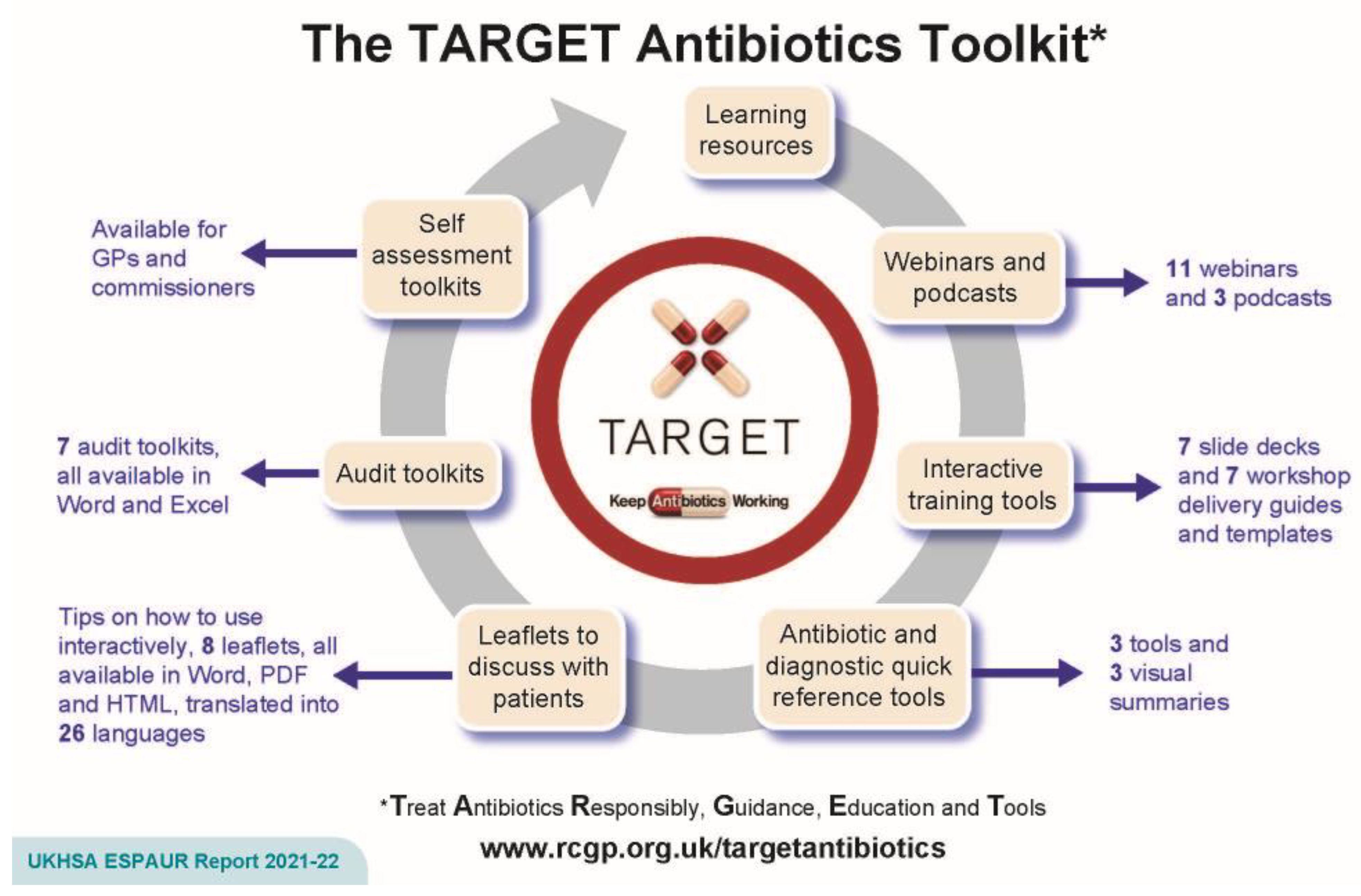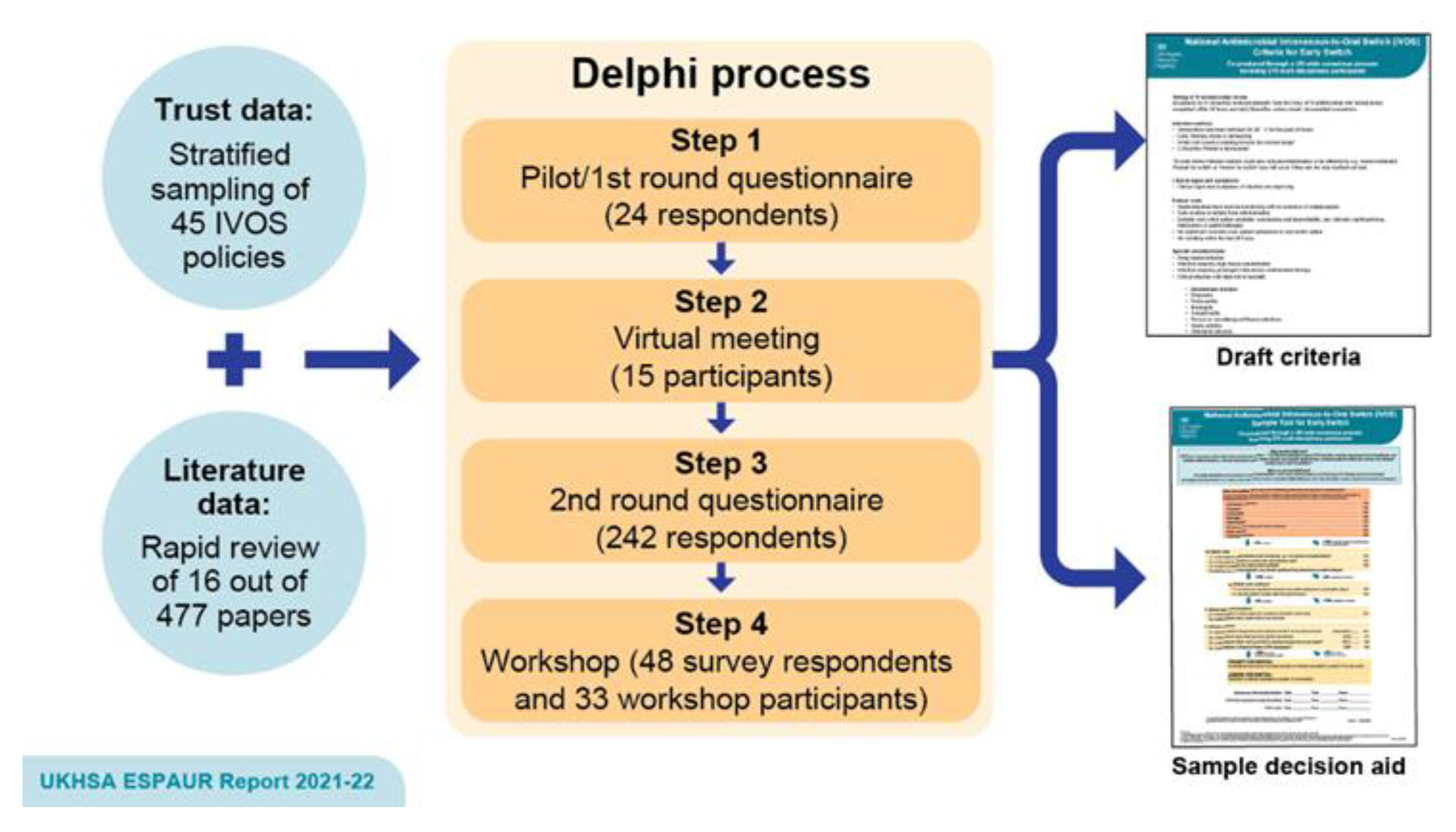National Antimicrobial Stewardship Activities in Primary and Secondary Care in England 2021–22 (ESPAUR Report) †
Abstract
1. Introduction
2. Development and Implementation of TARGET Antibiotics Toolkit Resources for Primary Care and Community Pharmacy
2.1. Update of the TARGET Antibiotics Toolkit
2.2. Implementation of the TARGET Antibiotic Checklist in Community Pharmacy
2.3. Developing Tools for the Management of Long-Term and Repeated Antibiotic Use in General Practice
3. Development of a National Intravenous-to-Oral Switch (IVOS) Criteria for Use in Secondary Care
4. Conclusions
Author Contributions
Funding
Institutional Review Board Statement
Informed Consent Statement
Data Availability Statement
Acknowledgments
Conflicts of Interest
References
- Tackling Antimicrobial Resistance 2019 to 2024: The UK’s 5-Year National Action Plan. Available online: https://www.gov.uk/government/publications/uk-5-year-action-plan-for-antimicrobial-resistance-2019-to-2024 (accessed on 20 August 2022).
- Ashiru-Oredope, D.; Hopkins, S.; on behalf of the English Surveillance Programme for Antimicrobial Utilization and Resistance Oversight Group; Kessel, A.; Hopkins, S.; Ashiru-Oredope, D.; Brown, B.; Brown, N.; Carter, S.; Charlett, A.; et al. Antimicrobial stewardship: English surveillance programme for antimicrobial utilization and resistance (ESPAUR). J. Antimicrob. Chemother. 2013, 68, 2421–2423. [Google Scholar] [CrossRef] [PubMed]
- Hayes, C.; Casale, E.; Lecky, D.; O’Neil, L.; Sides, E.; Cooper, E.; Pursey, F.; Pa-rekh, S.; Fisher, L.; MacKenna, B.; et al. Chapter 4 Antimicrobial Stewardship. In English Surveillance Programme for Antimicrobial Utilisation and Resistance (ESPAUR) Report 2021 to 2022; UK Health Security Agency: London, UK, 2022. [Google Scholar]
- TARGET Antibiotics Toolkit Hub. Available online: https://elearning.rcgp.org.uk/course/view.php?id=553.2022 (accessed on 15 August 2022).
- TARGET Antibiotics Toolkit Hub-Leaflets to Discuss with Patients. Available online: https://elearning.rcgp.org.uk/mod/book/view.php?id=12647 (accessed on 15 August 2022).
- TARGET Antibiotics Toolkit Hub–Resources for the Community Pharmacy Setting. Available online: https://elearning.rcgp.org.uk/mod/book/view.php?id=13511 (accessed on 15 August 2022).
- The Community Pharmacy Contractual Framework for 2019/20 to 2023/24: Supporting Delivery for the NHS Long Term Plan. Available online: https://www.gov.uk/government/publications/community-pharmacy-contractual-framework-2019-to-2024 (accessed on 15 August 2022).
- Antimicrobial Resistance: Guidance and Regulation Collection. Available online: https://www.gov.uk/health-and-social-care/antimicrobial-resistance (accessed on 15 August 2022).


Disclaimer/Publisher’s Note: The statements, opinions and data contained in all publications are solely those of the individual author(s) and contributor(s) and not of MDPI and/or the editor(s). MDPI and/or the editor(s) disclaim responsibility for any injury to people or property resulting from any ideas, methods, instructions or products referred to in the content. |
© 2023 by the authors. Licensee MDPI, Basel, Switzerland. This article is an open access article distributed under the terms and conditions of the Creative Commons Attribution (CC BY) license (https://creativecommons.org/licenses/by/4.0/).
Share and Cite
Casale, E.; Hayes, C.V.; Lecky, D.; O’Neil, L.; Sides, E.; Cooper, E.; Pursey, F.; Parekh, S.; Harvey, E.J.; Ashiru-Oredope, D. National Antimicrobial Stewardship Activities in Primary and Secondary Care in England 2021–22 (ESPAUR Report). Med. Sci. Forum 2022, 15, 14. https://doi.org/10.3390/msf2022015014
Casale E, Hayes CV, Lecky D, O’Neil L, Sides E, Cooper E, Pursey F, Parekh S, Harvey EJ, Ashiru-Oredope D. National Antimicrobial Stewardship Activities in Primary and Secondary Care in England 2021–22 (ESPAUR Report). Medical Sciences Forum. 2022; 15(1):14. https://doi.org/10.3390/msf2022015014
Chicago/Turabian StyleCasale, Ella, Catherine V. Hayes, Donna Lecky, Luke O’Neil, Eirwen Sides, Emily Cooper, Fionna Pursey, Sejal Parekh, Eleanor J. Harvey, and Diane Ashiru-Oredope. 2022. "National Antimicrobial Stewardship Activities in Primary and Secondary Care in England 2021–22 (ESPAUR Report)" Medical Sciences Forum 15, no. 1: 14. https://doi.org/10.3390/msf2022015014
APA StyleCasale, E., Hayes, C. V., Lecky, D., O’Neil, L., Sides, E., Cooper, E., Pursey, F., Parekh, S., Harvey, E. J., & Ashiru-Oredope, D. (2022). National Antimicrobial Stewardship Activities in Primary and Secondary Care in England 2021–22 (ESPAUR Report). Medical Sciences Forum, 15(1), 14. https://doi.org/10.3390/msf2022015014






